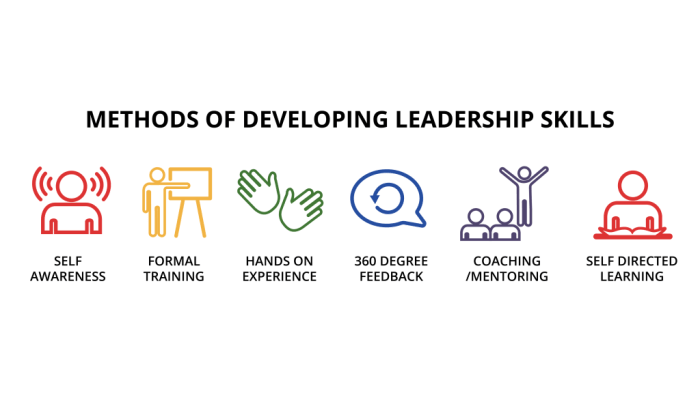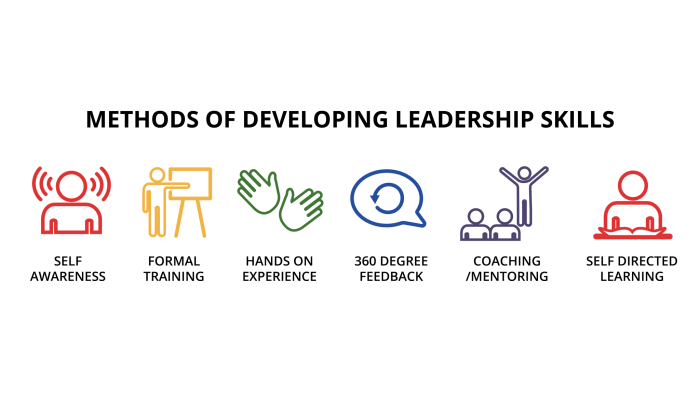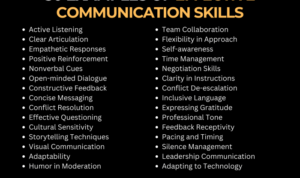Developing Leadership Skills is the key to unlocking your true potential and making a mark in the world. From enhancing communication to fostering innovation, this journey is all about growth and empowerment.
Get ready to dive into the realm of leadership like never before, where every skill learned is a step towards becoming a dynamic and influential leader.
Importance of Developing Leadership Skills

In today’s fast-paced world, developing leadership skills is crucial for personal and professional growth. It not only helps individuals stand out in their careers but also enables them to effectively navigate challenges and inspire others to achieve common goals.
Positive Impact on Team Dynamics
- Effective communication: Strong leadership skills promote clear and open communication within a team, leading to better collaboration and understanding.
- Conflict resolution: Leaders with developed skills can manage conflicts within a team efficiently, preventing misunderstandings from escalating.
- Empowerment: By empowering team members and delegating tasks effectively, leadership skills create a sense of ownership and motivation among team members.
Benefits in Various Aspects of Life
- Personal growth: Developing leadership skills enhances self-confidence, decision-making abilities, and resilience, contributing to personal development.
- Professional advancement: Strong leadership skills are highly valued by employers and can lead to career progression and increased opportunities.
- Community impact: Leadership skills enable individuals to take initiative, inspire change, and contribute positively to their communities.
Key Leadership Skills to Develop
Developing leadership skills goes beyond just having a title or position of authority. It requires a set of essential qualities that enable individuals to inspire and lead others effectively.
Communication
Effective communication is crucial for leaders to convey their vision, goals, and expectations clearly to their team members. It involves active listening, empathy, and the ability to articulate ideas in a way that resonates with others.
Decision-making
Leaders must possess strong decision-making skills to navigate challenges and make informed choices for the benefit of the team or organization. This includes evaluating options, considering consequences, and taking decisive action when needed.
Emotional Intelligence
Emotional intelligence plays a vital role in leadership, as it involves understanding and managing one’s emotions and those of others. Leaders with high emotional intelligence can build strong relationships, resolve conflicts, and inspire trust among team members.
Adaptability and Resilience
In a fast-paced and ever-changing environment, leaders need to be adaptable and resilient to navigate uncertainties and setbacks. Being able to pivot, learn from failures, and bounce back stronger are essential qualities for effective leadership.
Creativity and Innovation
Fostering creativity and innovation within a team can lead to new ideas, solutions, and approaches to challenges. Leaders who encourage a culture of innovation empower their team members to think outside the box and drive progress.
Strategies for Developing Leadership Skills

To become a successful leader, it is crucial to focus on developing key skills such as communication, decision-making, and emotional intelligence. Here are some practical strategies to enhance these skills:
Improving Communication Skills, Developing Leadership Skills
Effective communication is essential for any leader to convey ideas, build relationships, and inspire others. Here are some methods to improve communication skills:
- Practice active listening to truly understand others’ perspectives before responding.
- Work on clarity and conciseness in your verbal and written communication.
- Seek feedback from others to identify areas for improvement and make necessary adjustments.
Enhancing Decision-Making Abilities
Decision-making is a critical aspect of leadership that requires a balance of logic and intuition. Here’s how you can enhance your decision-making abilities:
- Learn to evaluate risks and rewards associated with each decision before making a final choice.
- Seek mentorship or training programs that focus on decision-making strategies and techniques.
- Practice making decisions in various scenarios to gain experience and confidence in your choices.
Cultivating Emotional Intelligence
Emotional intelligence plays a significant role in leadership by helping leaders understand and manage their emotions and those of their team members. Consider organizing workshops or seminars to cultivate emotional intelligence among team members:
- Encourage open communication and create a safe space for team members to express their emotions.
- Provide training on empathy, self-awareness, and conflict resolution to enhance emotional intelligence skills.
- Lead by example and demonstrate emotional intelligence in your interactions with others.
Leadership Development Programs: Developing Leadership Skills
Leadership development programs are crucial for aspiring leaders to enhance their skills and abilities in leading teams effectively. These programs offer a structured approach to learning and development, providing participants with the necessary tools and knowledge to excel in leadership roles.
Comparison of Different Leadership Development Programs
- Corporate Leadership Programs: These programs are often offered by companies to develop their internal talent pool. They focus on building leadership skills specific to the organization’s goals and values.
- Executive Coaching Programs: These programs involve one-on-one coaching sessions with experienced leaders to provide personalized guidance and feedback on leadership development.
- Academic Leadership Programs: Institutions offer academic programs focused on leadership development, providing a theoretical framework combined with practical skills for leadership roles.
Effectiveness of Mentorship in Developing Leadership Skills
Mentorship plays a crucial role in developing leadership skills by providing aspiring leaders with guidance, support, and real-world insights. A mentor can offer valuable advice, share experiences, and help navigate challenges that arise in leadership roles.
Impact of Leadership Training Courses
- Enhancing Communication Skills: Leadership training courses often focus on improving communication skills, including active listening, effective feedback, and clear articulation of ideas.
- Building Emotional Intelligence: Courses on emotional intelligence help leaders understand and manage their emotions, as well as those of their team members, leading to better relationships and team dynamics.
- Developing Strategic Thinking: Leadership training programs emphasize strategic thinking, decision-making, and problem-solving skills to enable leaders to navigate complex situations successfully.












